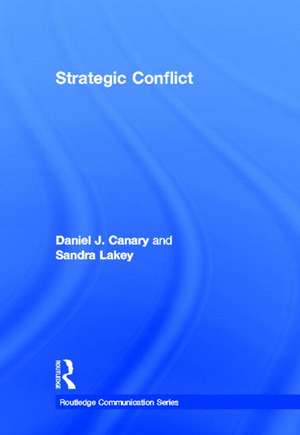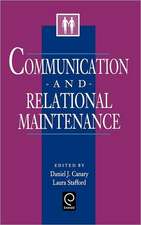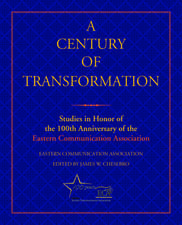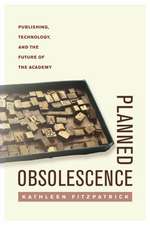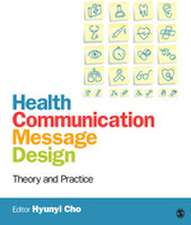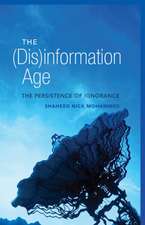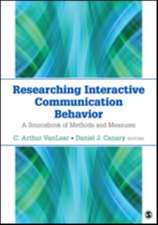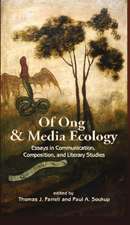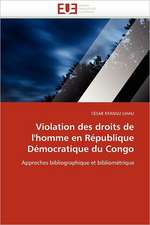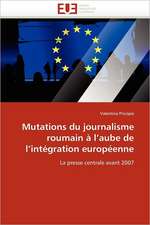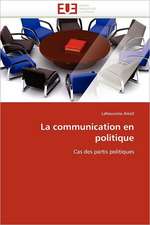Strategic Conflict: Routledge Communication Series
Autor Daniel J. Canary, Sandra Lakeyen Limba Engleză Hardback – 3 iul 2012
| Toate formatele și edițiile | Preț | Express |
|---|---|---|
| Paperback (1) | 346.92 lei 6-8 săpt. | |
| Taylor & Francis – 3 iul 2012 | 346.92 lei 6-8 săpt. | |
| Hardback (1) | 1007.48 lei 6-8 săpt. | |
| Taylor & Francis – 3 iul 2012 | 1007.48 lei 6-8 săpt. |
Din seria Routledge Communication Series
- 9%
 Preț: 575.55 lei
Preț: 575.55 lei - 9%
 Preț: 576.44 lei
Preț: 576.44 lei -
 Preț: 155.44 lei
Preț: 155.44 lei - 8%
 Preț: 495.23 lei
Preț: 495.23 lei - 8%
 Preț: 417.13 lei
Preț: 417.13 lei - 15%
 Preț: 404.22 lei
Preț: 404.22 lei -
 Preț: 392.97 lei
Preț: 392.97 lei - 8%
 Preț: 516.78 lei
Preț: 516.78 lei -
 Preț: 171.85 lei
Preț: 171.85 lei - 8%
 Preț: 509.91 lei
Preț: 509.91 lei - 8%
 Preț: 460.12 lei
Preț: 460.12 lei - 8%
 Preț: 394.36 lei
Preț: 394.36 lei -
 Preț: 424.75 lei
Preț: 424.75 lei - 15%
 Preț: 431.10 lei
Preț: 431.10 lei -
 Preț: 364.94 lei
Preț: 364.94 lei -
 Preț: 363.96 lei
Preț: 363.96 lei - 25%
 Preț: 325.34 lei
Preț: 325.34 lei - 15%
 Preț: 463.49 lei
Preț: 463.49 lei - 15%
 Preț: 467.42 lei
Preț: 467.42 lei -
 Preț: 366.85 lei
Preț: 366.85 lei -
 Preț: 264.53 lei
Preț: 264.53 lei - 16%
 Preț: 247.75 lei
Preț: 247.75 lei -
 Preț: 354.28 lei
Preț: 354.28 lei -
 Preț: 374.27 lei
Preț: 374.27 lei - 22%
 Preț: 321.54 lei
Preț: 321.54 lei -
 Preț: 421.07 lei
Preț: 421.07 lei -
 Preț: 481.52 lei
Preț: 481.52 lei -
 Preț: 442.50 lei
Preț: 442.50 lei -
 Preț: 498.91 lei
Preț: 498.91 lei -
 Preț: 369.95 lei
Preț: 369.95 lei - 24%
 Preț: 133.28 lei
Preț: 133.28 lei - 31%
 Preț: 325.43 lei
Preț: 325.43 lei - 30%
 Preț: 769.37 lei
Preț: 769.37 lei -
 Preț: 447.05 lei
Preț: 447.05 lei - 18%
 Preț: 722.88 lei
Preț: 722.88 lei -
 Preț: 389.60 lei
Preț: 389.60 lei -
 Preț: 249.75 lei
Preț: 249.75 lei -
 Preț: 395.37 lei
Preț: 395.37 lei -
 Preț: 363.96 lei
Preț: 363.96 lei - 18%
 Preț: 1004.72 lei
Preț: 1004.72 lei - 18%
 Preț: 998.71 lei
Preț: 998.71 lei -
 Preț: 380.22 lei
Preț: 380.22 lei - 26%
 Preț: 243.26 lei
Preț: 243.26 lei -
 Preț: 102.17 lei
Preț: 102.17 lei -
 Preț: 242.11 lei
Preț: 242.11 lei - 20%
 Preț: 402.68 lei
Preț: 402.68 lei -
 Preț: 226.33 lei
Preț: 226.33 lei -
 Preț: 386.14 lei
Preț: 386.14 lei -
 Preț: 241.09 lei
Preț: 241.09 lei - 18%
 Preț: 961.37 lei
Preț: 961.37 lei
Preț: 1007.48 lei
Preț vechi: 1228.63 lei
-18% Nou
Puncte Express: 1511
Preț estimativ în valută:
192.84€ • 209.54$ • 162.09£
192.84€ • 209.54$ • 162.09£
Carte tipărită la comandă
Livrare economică 21 aprilie-05 mai
Preluare comenzi: 021 569.72.76
Specificații
ISBN-13: 9780805850635
ISBN-10: 0805850635
Pagini: 268
Ilustrații: Illustrations
Dimensiuni: 152 x 229 x 16 mm
Greutate: 0.66 kg
Ediția:1
Editura: Taylor & Francis
Colecția Routledge
Seria Routledge Communication Series
Locul publicării:Oxford, United Kingdom
ISBN-10: 0805850635
Pagini: 268
Ilustrații: Illustrations
Dimensiuni: 152 x 229 x 16 mm
Greutate: 0.66 kg
Ediția:1
Editura: Taylor & Francis
Colecția Routledge
Seria Routledge Communication Series
Locul publicării:Oxford, United Kingdom
Public țintă
UndergraduateCuprins
1: The Need for Strategic Conflict
2: Seeking Strategic Control: Communication Strategies and Tactics
3: Maintenance and Conflict: a Dual Process View
4: Seeking Episode Control: Conflict Instigation Due to Alcohol, Moods, Emotions, Stress, and the Environment
5: Interpersonal Transgressions
6: Accounts
7: Seeking Personal Control: Personality Differences in Managing Conflict
8: Power and Power Strategies
9: Seeking Attributional Control: Interpreting Conflict
10: Intercultural Conflict
11: Seeking Goal Control: Goal Achievement and Defense
12: Health and Conflict
13: Ongoing Serial Conflict
14: Abuse, Divorce, and Effects on Children
15: Seeking Resolution through Forgiveness
2: Seeking Strategic Control: Communication Strategies and Tactics
3: Maintenance and Conflict: a Dual Process View
4: Seeking Episode Control: Conflict Instigation Due to Alcohol, Moods, Emotions, Stress, and the Environment
5: Interpersonal Transgressions
6: Accounts
7: Seeking Personal Control: Personality Differences in Managing Conflict
8: Power and Power Strategies
9: Seeking Attributional Control: Interpreting Conflict
10: Intercultural Conflict
11: Seeking Goal Control: Goal Achievement and Defense
12: Health and Conflict
13: Ongoing Serial Conflict
14: Abuse, Divorce, and Effects on Children
15: Seeking Resolution through Forgiveness
Notă biografică
Daniel J. Canary is Professor in the Hugh Downs School of Human Communication at Arizona State University and has previously taught at Penn State University, Ohio University, Cal State Fullerton, and Florida Tech. His research interests include conflict communication, conversational argument, relational maintenance behaviors, and sex differences and similarities in communication.
Sandra Lakey is Associate Professor of Communication and Composition and head of the Communication and Literature Department at Pennsylvania College of Technology. She previously taught at Lycoming College and C. S. Mott Community College. Her research interests include conflict communication, communication competence, and classroom communication.
Sandra Lakey is Associate Professor of Communication and Composition and head of the Communication and Literature Department at Pennsylvania College of Technology. She previously taught at Lycoming College and C. S. Mott Community College. Her research interests include conflict communication, communication competence, and classroom communication.
Recenzii
"Strategic Conflict provides an innovative option for those teaching the college course on interpersonal conflict. This is not the standard text in either style or coverage but one that will appeal to instructors who desire a research-based, yet accessible, book that highlights communication processes in a concrete and substantive way. Canary and Lakey proceed from the well-reasoned premise that competence in conflict rests on mindful and ethical choices about communication. They reinforce this premise throughout, emphasizing the practical implications of communication-based research. The book translates research in a voice that students should find personally relevant and clear, reinforced by well-chosen illustrations, summaries, and practical suggestions."
-- Alan Sillars, Department of Communication Studies, University of Montana, USA
"Strategic conflict is an inevitable part of the human condition. Since time immemorial, the ability to deal with conflict has been an essential survival skill, and continues to be a key challenge in our personal and working lives today. Managing strategic conflict can also be adaptive, a source of discovery, renewal and stimulation. This excellent book offers a comprehensive survey of recent research and theories on the nature, functions and characteristics of strategic conflict, and provides important new insights into the fundamental links between how strategic conflict is managed, and the psychology of power, emotions, culture, communication, goals and health outcomes. A valuable book, it should be required reading by all students, researchers and applied professionals interested in understanding, and dealing with everyday strategic conflict situations."
-- Joseph P. Forgas, Scientia Professor of Psychology, University of New South Wales, Sydney, Australia
"This is an excellent volume. Unlike many books in the area, Canary and Lakey base their analysis of conflict a of assumptions about how to successfully deal with disagreements. At its core, the framework is focused on the degree to which individuals are mindful of various aspects that occur during conflict. By being mindful, they can strategically form a plan of action that can be adapted as needed. Literature related to the framework is thoroughly discussed and examples and case studies are provided. The recommendations are both data based and practical. Even more importantly, the authors are keenly aware of the limitations or boundaries of their framework. In doing so, they provide useful insights while avoiding the hyperbole that often accompanies discussion of conflict. Their approach is well grounded in reality."
-- Michael Roloff, Department of Communication, Northwestern University, USA
-- Alan Sillars, Department of Communication Studies, University of Montana, USA
"Strategic conflict is an inevitable part of the human condition. Since time immemorial, the ability to deal with conflict has been an essential survival skill, and continues to be a key challenge in our personal and working lives today. Managing strategic conflict can also be adaptive, a source of discovery, renewal and stimulation. This excellent book offers a comprehensive survey of recent research and theories on the nature, functions and characteristics of strategic conflict, and provides important new insights into the fundamental links between how strategic conflict is managed, and the psychology of power, emotions, culture, communication, goals and health outcomes. A valuable book, it should be required reading by all students, researchers and applied professionals interested in understanding, and dealing with everyday strategic conflict situations."
-- Joseph P. Forgas, Scientia Professor of Psychology, University of New South Wales, Sydney, Australia
"This is an excellent volume. Unlike many books in the area, Canary and Lakey base their analysis of conflict a of assumptions about how to successfully deal with disagreements. At its core, the framework is focused on the degree to which individuals are mindful of various aspects that occur during conflict. By being mindful, they can strategically form a plan of action that can be adapted as needed. Literature related to the framework is thoroughly discussed and examples and case studies are provided. The recommendations are both data based and practical. Even more importantly, the authors are keenly aware of the limitations or boundaries of their framework. In doing so, they provide useful insights while avoiding the hyperbole that often accompanies discussion of conflict. Their approach is well grounded in reality."
-- Michael Roloff, Department of Communication, Northwestern University, USA
Descriere
Strategic Conflict offers a research-based, accessible analysis of how people can manage conflict productively. Moving beyond the basics of conflict, it examines interpersonal situations in which conflict occurs and promotes strategic communicative responses based on the latest theoretical research. It provides students with the tools to understand conflict in real-world contexts.
